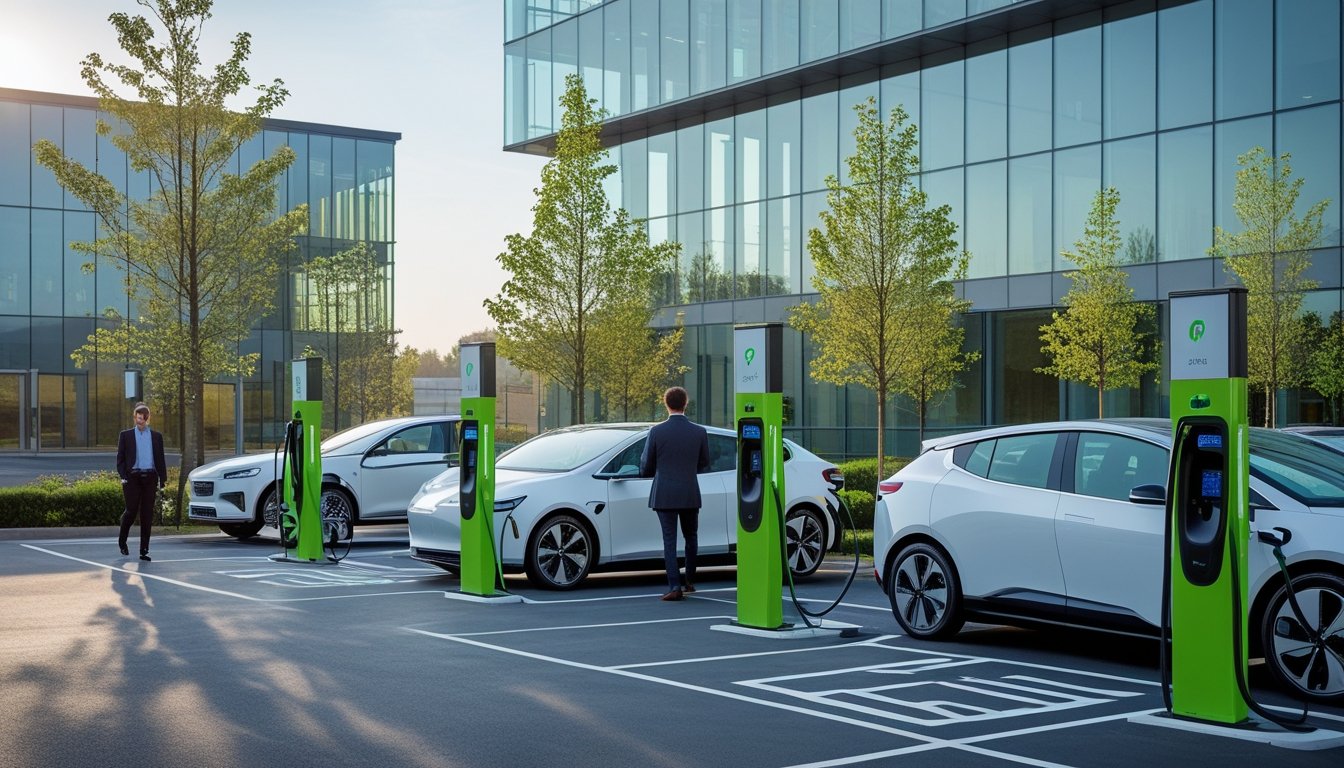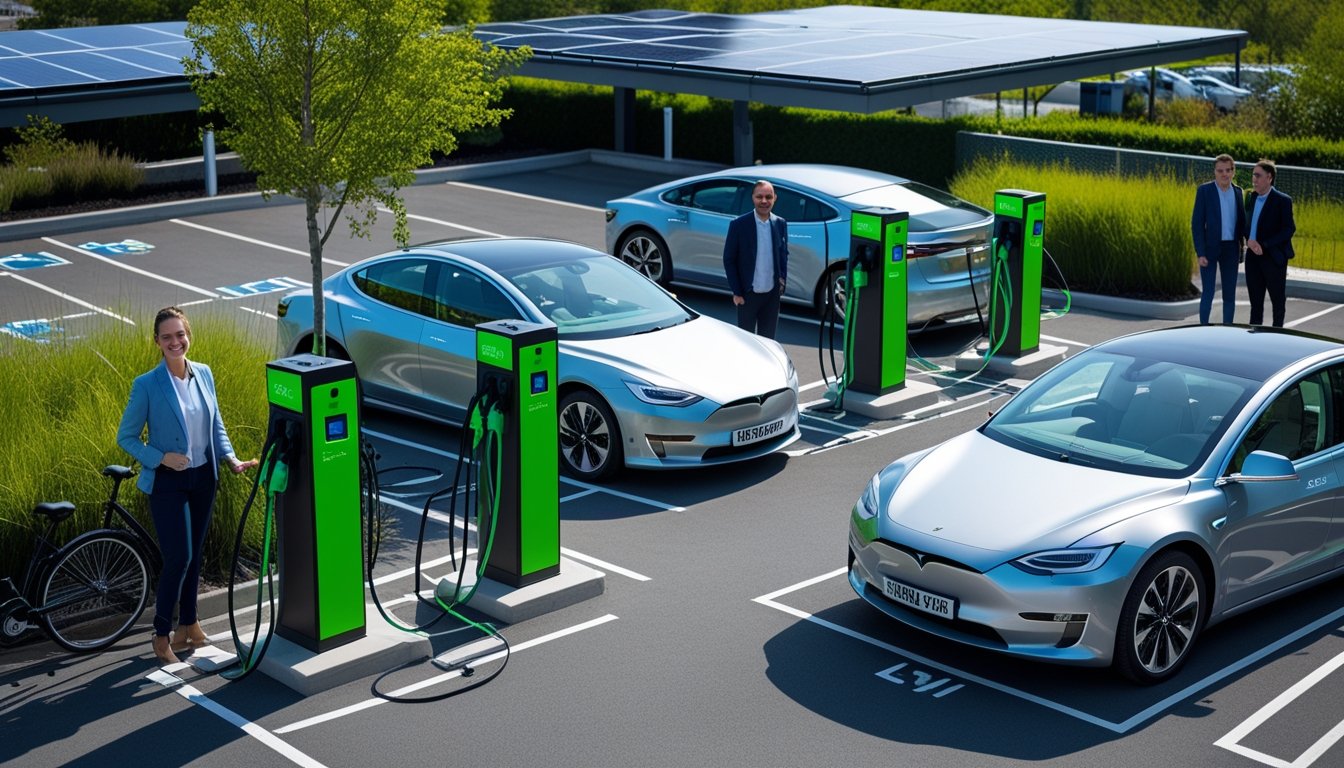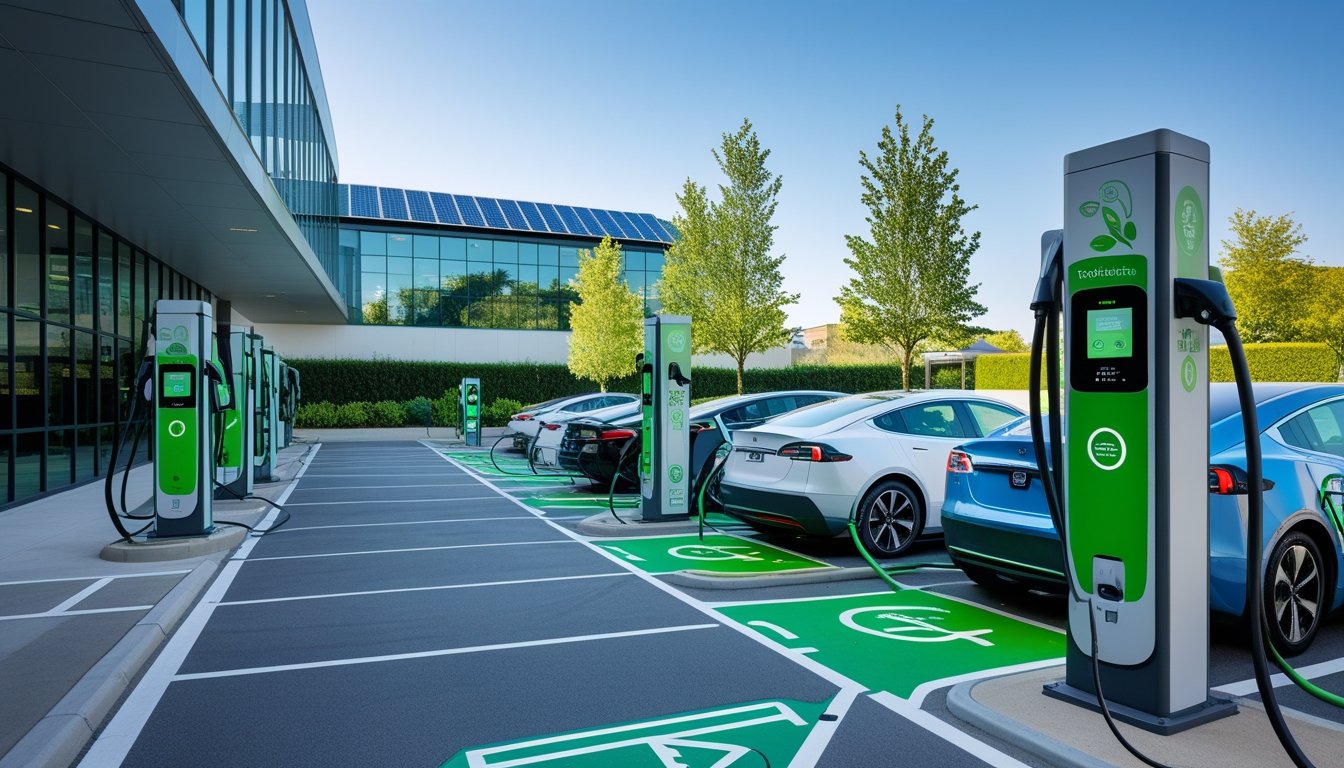Late updated: 08 Jun 2025 13:06
Written by: Amber Collins
Innovative Green Charging Solutions For UK Workplaces: Revolutionising Sustainability in the Office
Transitioning to electric vehicle (EV) charging at workplaces is a strategic move for businesses striving for sustainability and modernity. Offering EV charging not only aligns with environmental goals but also enhances a company’s reputation as a forward-thinking and eco-friendly workplace. This integration of green charging solutions meets both the needs of employees and the growing demand for sustainable practices in business.

As we explore the EV charging landscape, it's evident that innovative solutions are setting the standard for workplaces across the UK. Companies such as Blink Charging and Novuna are leading the charge, offering installation and management services that cater to diverse business needs. These initiatives not only serve as a statement of commitment to reducing carbon footprints but also as practical outcomes that benefit both organisations and their workforce.
Workplace charging solutions present a compelling opportunity for companies to attract environmentally conscious employees and foster a culture of sustainability. With schemes like the Workplace Charging Scheme (WCS) available in the UK, investing in these solutions is not only beneficial but also financially viable for many businesses.
Key Takeaways
- Green charging supports eco-friendly business practices.
- Innovative charging solutions enhance workplace appeal.
- Sustainable options are becoming more accessible in the UK.
The Fundamentals of Green Charging for UK Workplaces
In our exploration of green charging solutions for UK workplaces, we'll cover the essential elements required for integrating and supporting electric vehicle charging. These fundamentals include key components of workplace EV charging, various types of office-centric EV charging solutions, the integration of sustainable energy, and fostering EV adoption among employees.
Key Components of Workplace EV Charging
To establish efficient workplace EV charging, several core components are necessary. At the forefront is the charging infrastructure, which includes charging stations and the associated hardware. These need to be robust, user-friendly, and scalable to accommodate future growth in the number of electric vehicles.
Monitoring systems are another critical element. They track usage patterns and energy consumption, providing insights for optimising operations and managing electricity costs effectively. Smart charging technology helps manage energy usage by scheduling charging during off-peak hours, thereby reducing electricity expenses for the workplace.
Additionally, connectivity is vital. Charging stations should integrate with management platforms that offer real-time updates and remote access to charge point status and diagnostics. Ensuring these components are in place creates a solid foundation for workplace EV charging.
Types of EV Charging Solutions for Offices
Different types of EV charging solutions cater to diverse office environments and needs. AC Level 1 chargers are suitable for workplaces where vehicles are parked for an extended period. Although they charge more slowly, they are cost-effective for long-term parking scenarios.
For quicker charging, AC Level 2 chargers are preferred. They provide a balanced solution, offering faster charging times while still being cost-efficient, making them suitable for most office settings. DC fast chargers present the fastest option, ideal for businesses with high turnover in parking spaces, ensuring vehicles can charge quickly.
Each type serves a distinct role, allowing businesses to tailor their charging infrastructure to their specific requirements. By selecting the appropriate solution, companies can efficiently meet their energy and charging needs.
Integrating Charging Infrastructure With Sustainable Energy
Incorporating sustainable energy sources is crucial for truly green charging solutions. Solar panels and wind turbines can be integrated into the charging infrastructure, reducing reliance on the grid and lowering the carbon footprint. These renewable sources can supply a significant portion of the energy needed for EV charging.
Energy storage systems, like battery storage, help manage demand by storing surplus energy generated during peak productivity, making it available during periods of high usage or limited production. This not only aids in energy management but also supports the resilience of the charging network.
Adopting smart grid technologies further enhances the integration by facilitating efficient distribution and use of all available resources. By aligning charging infrastructure with sustainable energy practices, we can ensure a cleaner and more sustainable future for workplace charging.
Supporting EV Adoption Among Employees
To encourage EV adoption among employees, businesses must prioritise both infrastructure and incentives. Providing ample EV charging points and ensuring their availability is a significant step. Such infrastructure alleviates concerns regarding charging accessibility, making the switch to electric vehicles appealing.
Offering incentive programmes enhances this appeal. These can include discounts on electricity for charging or financial support for employees purchasing electric vehicles. Educational workshops help demystify EV ownership, addressing common concerns and highlighting benefits.
By fostering an environment that supports electric vehicle use, businesses can play a pivotal role in increasing EV adoption rates. A commitment to providing necessary resources and incentives brings us closer to a more sustainable future.
Innovations and Best Practices in Sustainable Charging

Innovative charging solutions are transforming the UK’s approach to sustainable energy. By leveraging solar power, smart management systems, and strategic action toward net zero emissions, businesses can optimise their electric vehicle infrastructure.
Leveraging Solar Power and Photovoltaics
Utilising solar power involves installing photovoltaic systems that convert sunlight into electricity. This provides renewable energy for electric vehicle chargers, reducing our dependency on non-renewable sources.
Photovoltaic panels can be integrated into carports, making efficient use of space whilst providing shaded parking for employees. They reduce grid reliance and energy costs. Moreover, incentives such as the UK’s Solar Tax Exemption encourage us to adopt such installations, further promoting sustainable energy initiatives in corporate settings.
Smart Charge Point Management and Analytics
Managing charge points efficiently is pivotal for workplace sustainability. By using advanced analytics and smart management systems, we can balance energy loads, ensure optimal usage, and avoid peak energy times.
These systems provide real-time data on energy consumption and charging patterns, enabling us to make informed decisions. Furthermore, predictive maintenance through analytics reduces downtime and operational costs, ensuring chargers remain reliable. Implementing smart management strategies also supports the broader goal of transitioning to sustainable transport solutions.
Strategies for Achieving Net Zero Emissions
To achieve net zero emissions, workplaces must focus on reducing their carbon footprint through strategic planning and implementation of green technologies. Key strategies include adopting commercial EV chargers powered by renewables and setting clear emission reduction targets.
Integrating sustainable energy sources like solar into the charging infrastructure is critical. Policies and incentives from the government also play a crucial role in supporting these initiatives. By actively monitoring our progress through regular reporting and engaging stakeholders, we work collaboratively towards achieving sustainability goals.
Frequently Asked Questions

We explore key concerns businesses may encounter when implementing workplace electric vehicle (EV) charging solutions in the UK. This includes identifying top charging options, ensuring eco-friendly facilities, and understanding incentives that support sustainability goals.
What are the most efficient workplace charging solutions for electric vehicles currently available in the UK?
Currently, the UK market offers several efficient EV charging solutions tailored for workplaces. Notable brands include myenergi and Rolec, known for their reliable and smart charging technologies. These systems often support multiple charge points, integrating with energy management systems to optimise electricity use and reduce costs.
How can businesses ensure their workplace EV charging facilities are sustainable and eco-friendly?
Businesses can enhance the sustainability of their charging facilities by selecting providers offering green energy options, such as solar-powered chargers. Partnering with companies that incorporate renewable energy sources and leveraging smart energy management systems will contribute to a reduced carbon footprint.
What incentives are there for UK companies to install green charging stations for employees?
Several government incentives exist to encourage companies to install EV charging stations. The Workplace Charging Scheme offers grants for the upfront costs of purchase and installation. Additionally, tax benefits such as Enhanced Capital Allowances can provide further financial motivation for businesses making sustainable investments.
Which companies provide the best workplace EV charging infrastructure in the UK?
Prominent providers of workplace EV charging infrastructure in the UK include Blink, Rolec, and myenergi. These companies not only deliver comprehensive solutions but also ensure high standards of customer support and system reliability, making them popular choices for businesses seeking efficient charging options.
How does the installation of EV charging points at work support the UK's carbon reduction targets?
Installing workplace EV charging points helps reduce emissions by promoting cleaner transportation options. This supports the UK's broader carbon reduction targets by encouraging the adoption of low-emission vehicles among employees. Infrastructure development contributes to a sustainable transportation network, further aligning with national environmental goals.
What considerations should businesses make when choosing a provider for workplace EV charging solutions?
When selecting a provider, businesses should evaluate factors such as cost, ease of installation, and support services. It's crucial to assess the scalability of the solution to cater to future expansion. Companies should also consider compliance with industry standards and the ability to integrate with existing energy systems.
